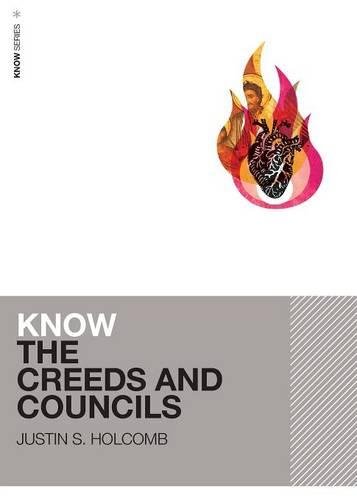A Brief Book Summary from Books At a Glance
By Justin Powell
Overview
Know the Creeds and Councils is a part of the KNOW series from Zondervan which is designed for both personal study and a classroom group. Holcomb summarizes the creeds and councils of Church History in order to: (1) encourage readers to explore the rich history and theology in the Christian tradition, (2) motivate love for the ecumenical church, and (3) increase Christian dependence on God’s revelation in Jesus Christ and Holy Scriptures.
Each chapter is devoted to a particular creed or council providing the historical political context for its development and the central issue at stake. While being faithful to orthodoxy, Holcomb describes the debates from both sides and gives a summary of the importance of the doctrine at stake.
Table of Contents
Introduction: What Are Creeds, Confessions, Catechisms, and Councils?
1 Apostle’s Creed (ca. 140)
2 Council of Nicaea and the Nicene Creed (325)
3 Councils of Ephesus (431, 449, 475)
4 Council of Chalcedon (451)
5 Athanasian Creed (Late 400s to Early 500s)
6 Councils of Constantinople (381, 553, 681)
7 Councils of Carthage and Orange (419 and 529)
8 Council of Trent (1545-63)
9 Heidelberg Catechism (1563)
10 Thirty-nine Articles of Religion (1563)
11 Westminster Confession of Faith (1646)
12 Second Vatican Council (1962-65)
13 Modern Confessions: Lausanne Covenant (1974) and Chicago
Conclusion
Summary
Chapter 1: Apostle’s Creed (ca. 140)
The so-called “Apostles’ Creed” provides the ‘rule of faith’ which has been used throughout the Church’s history. It gives the basic doctrines of the Christian faith including the Incarnation, the gospel story, and the forgiveness of sin. Later creeds would also expand where the Apostle’s Creed gives only a mention of the Holy Ghost and Christ’s relationship to the Father.
Chapter 2: Council of Nicaea and the Nicene Creed (325)
The Council of Nicaea addressed the heresy of Arianism and the questions Jesus’ two natures. Arius argued the Father held a different glory than the Son. Athanasius argued the Son and Father are co-equal in Divinity which became the stance of the Nicene Council. Thus, the Nicene Creed expands from the Apostle’s Creed by asserting the. . .
[To continue reading this summary, please see below....]The remainder of this article is premium content. Become a member to continue reading.
Already have an account? Sign In
